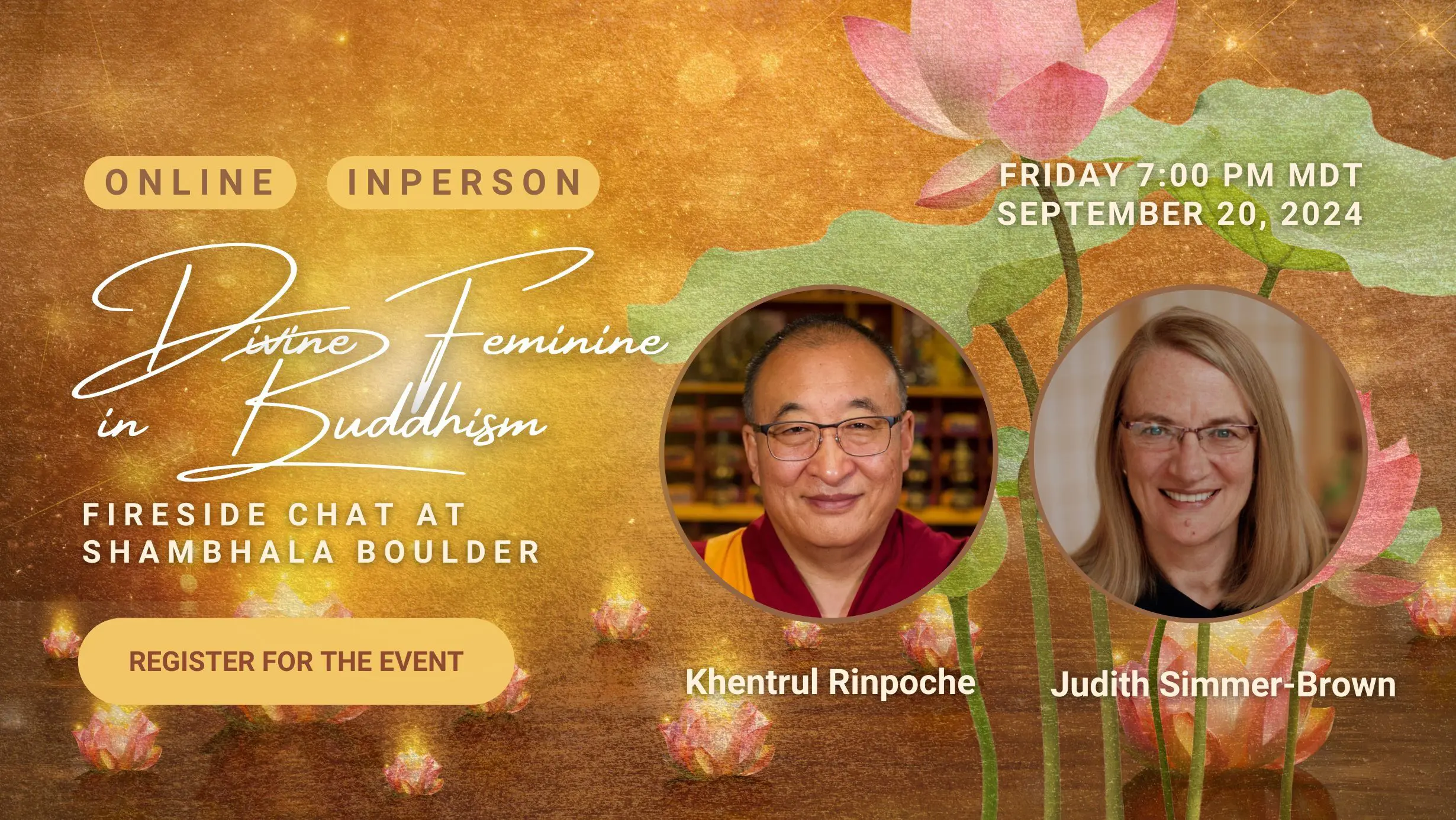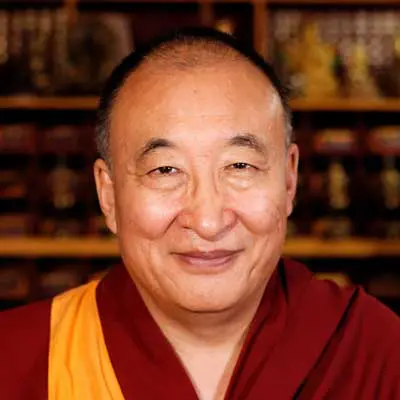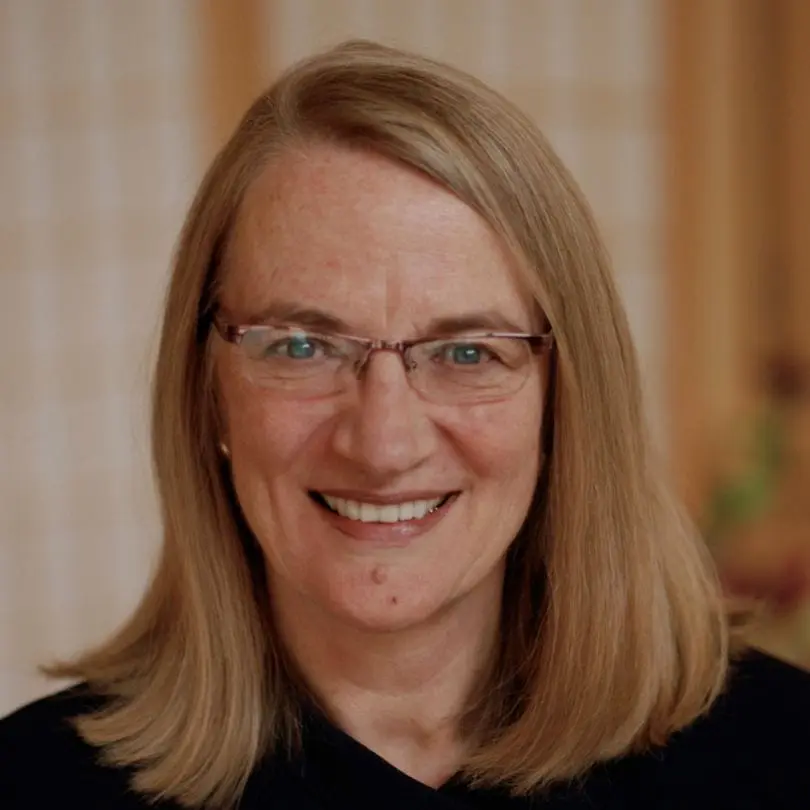
Fireside Chat on the Feminine Aspect of Buddhism with Khentrul Rinpoche and Judith Simmer-Brown
This is a FREE event and will be available both Online and In-person.
Please select the RSVP ticket if you wish to join for the Online or In-person event.
Khentrul Rinpoche and Judith Simmer-Brown sit down for a fireside chat on the feminine aspect of Buddhism. Tibetan Buddhism has for centuries been dominated by male Guru figures in patriarchal society. This lead women in Tibet to pray to be reborn a man and many women in western society question whether there are only male buddhas? This is far from the nature of what is actually taught in Dharma. In Kalachakra Tantra we have the ultimate union of both the feminine and masculine aspect both of which we need to realize enlightenment. So today Rinpoche and Judith sit down for a very special conversation to talk about the divine feminine aspect of practice and why all of us need these qualities in our lives. This is not a rejection of the male qualities. Sometimes when there is a talk on the feminine qualities or Khentrul Rinpoche has mentioned that there will be female Kalki in Shambhala, students wonder if this is a backlash or a rejection to the masculine. The answer is no. It’s an integration of all aspects of our nature. We are very fortunate to have Judith here to talk to us about this as she is the author of Dakini’s Warm Breath: The Feminine Principle in Tibetan Buddhism and has for a long time taught and explained this aspect.
About Judith Simmer-Brown
Judith Simmer-Brown, Ph.D., is Distinguished Professor of Contemplative and Religious Studies Emeritx at Naropa University in Boulder, Colorado, where she has taught since 1978. As Buddhist practitioner since the early 1970’s, she became a student of Chogyam Trungpa Rinpoche in 1974, and served as an acharya in Shambhala from 2000-2022. Her books are Dakini’s Warm Breath (Shambhala 2001)and Meditation and the Classroom: Contemplative Pedagogy for Religious Studies (SUNY 2011). She and her husband, Richard, have two adult children and four grandchildren.
About Khentrul Rinpoché
Khentrul Rinpoché Jamphel Lodrö is the founder and spiritual director of Dzokden. Rinpoche is the author of Unveiling Your Sacred Truth, The Great Middle Way: Clarifying the Jonang View of Other-Emptiness, A Happier Life, and The Hidden Treasure of the Profound Path.Rinpoche spent the first 20 years of his life herding yak and chanting mantras on the plateaus of Tibet. Inspired by the bodhisattvas, he left his family to study in a variety of monasteries under the guidance of over twenty-five masters in all the Tibetan Buddhist traditions. Due to his non-sectarian approach, he earned himself the title of Rimé (unbiased) Master and was identified as the reincarnation of the famous Kalachakra Master Ngawang Chözin Gyatso. While at the core of his teachings is the recognition that there is great value in the diversity of all spiritual traditions found in this world; he focuses on the Jonang-Shambhala tradition. Kalachakra (wheel of time) teachings contain profound methods to harmonize our external environment with the inner world of body and mind, ultimately bringing about the golden age of peace and harmony (Dzokden).
Schedule by Timezone
Boulder, Colorado – FRIDAY September 20, 2024 / 7:00 PM
Melbourne, Australia – SATURDAY September 21, 2024 / 11:00 AM
Hong Kong, Shanghai, Mongolia, Singapore and Taiwan – SATURDAY September 21, 2024 / 9:00 AM
Hanoi, Vietnam – SATURDAY September 21, 2024 / 8:00 AM
Romania – SATURDAY September 21, 2024 / 4:00 AM
Central Europe and South Africa – SATURDAY September 21, 2024 / 3:00 AM
Sao Paulo, Brazil – FRIDAY September 20, 2024 / 10:00 PM
East Coast USA, Toronto – FRIDAY September 20, 2024 / 9:00 PM
West Coast USA – FRIDAY September 20, 2024 / 6:00 PM
Zoom Information
Zoom information for online session will be sent via email after registration.
QUESTIONS?
Please email [email protected]
Intervenants
-
 Khentrul Rinpoche
Khentrul RinpocheKhentrul Rinpoche Jamphel Lodrö est le fondateur et le directeur spirituel de Dzokden. Rinpoche est l’auteur de Dévoiller votre vérité sacrée, la grande voie du millieu: Clarifier la vue Jonang de l’autre-vacuité, Une vie plus heureuse, et Le trésor caché de la voie profonde.
Rinpoche à passé les vingt premières années de sa vie à élever des Yacks et chanter des mantras sur les hauts plateaux du Tibet. Inspiré par les bodhisattvas, il quitte sa famille afin d’étudier dans divers monastères sous la guidance de plus de vingt-cinq maîtres de toutes les écoles du Bouddhisme Tibétain. Grace à cette approche non-sectaire il a obtenu le titre de maître Rimé (sans parti pris) et a été identifié comme la réincarnation du fameux maître Kalachakra Ngawang Chödzin Gyaltso. Alors que dans le cœur de son enseignement il reconnaît la grande valeur de la diversité de toutes les traditions spirituelles que l’on trouve dans ce monde, il se concentre essentiellement sur la tradition Jonang-Kalachakra. L’enseignement de Kalachakra (La roue du temps) contient la méthode profonde pour harmoniser l’environnement externe avec le monde interne du corps et de l’esprit, ultimement afin d’engendrer un âge d’or de paix et d’harmonie (Dzokden). -
 Judith Simmer-Brown
Judith Simmer-BrownJudith Simmer-Brown, docteur en philosophie, est professeur émérite d’études contemplatives et religieuses à l’université Naropa de Boulder, dans le Colorado, où elle enseigne depuis 1978. Pratiquant le bouddhisme depuis le début des années 1970, elle est devenue l’élève de Chogyam Trungpa Rinpoché en 1974 et a été acharya à Shambhala de 2000 à 2022. Ses spécialités d’enseignement sont la pratique de la méditation, les enseignements Shambhala, la philosophie bouddhiste, le bouddhisme tantrique et l’enseignement supérieur contemplatif. Son livre, Dakini’s Warm Breath (Shambhala 2001), explore le principe féminin tel qu’il se révèle dans la pratique de la méditation et dans la vie quotidienne des femmes et des hommes. Elle a également publié Meditation and the Classroom : Contemplative Pedagogy for Religious Studies (SUNY 2011). Elle et son mari, Richard, ont deux enfants adultes et quatre petits-enfants.



